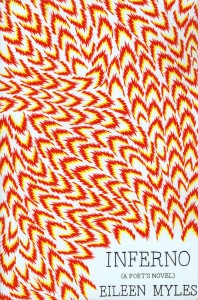My girlfriend got me an Eileen Myles t-shirt at this Sister Spit event in Oakland, it’s black with big purple letters reading “YOU’VE GOT THE STYLE EILEEN MYLES.” I wore it for the first time in Palm Springs to a Dinah Shore White Party which is a party where everyone wears white. And Dinah Shore is this gross annual lesbian “weekend” for girls who want to fingerfuck in swimming pools, oil wrestle in wet t-shirts, drink their faces off and scream at each other in public. All the lesbian websites send reps to Dinah Shore so we were there like a bunch of pasty nerds at a football game, and I was there in my black pants and black Eileen Myles t-shirt at The White Party and then suddenly everything turned black and then I wasn’t anywhere anymore. I was carried and I could hear things, like my friends saying I’d only had one drink and that my face was blue. Some minutes later in the hotel room as the EMTs were attaching things to me and announcing my alarming blood pressure I apparently garbled “it’s over,” to my friend Sarah. “It’s all over, Sarah. This is it.” Ha! She told me I’d said it a few times: “This is it, it’s all over. It’s all over. This is the end.”
I think she thought I meant “my life.” But although death felt remarkably possible at that moment, I didn’t think “my life is over.” I meant the way I’d been living. My ‘poem’ was over and hell had bottomed out. “I thought being an artist meant you had to do anything for the experience,” Eileen Myles writes in Inferno. That’s exactly what I’d done.
“In your twenties you just kind of chug along,” Eileen Myles says, “dredging up feelings as you go.” You “consider your behavior just art, grist for the mill.” So when I said “it’s over,” I was talking about the grist. Goodbye, mill.
I was being punished, I thought in my oxygen mask. For ignoring the voices in my head that’d told me I was doing it wrong and I’d be punished somehow if I kept that illegal job or started that business or moved there or spent that money or slept with him or did those five drugs at once or let her treat me like that. But I’m in control of this chaos, I’d insist. Even the hard parts. I’d lived through it, hadn’t I?
But then I was lying on a hospital bed like an idiot with YOU’VE GOT THE STYLE EILEEN MYLES on my chest. It was embarrassing. “Earlier (24) I had decided it would be okay to kill myself. At 27 it was okay to live,” Eileen Myles writes. Yes, me too, but I think I was 28, not 27. Not like I chose drama or instability, it just never scared me. Worst case scenario it’d be grist for the mill.
But if I, indeed, have the style like Eileen Myles, then those “bad” decisions weren’t the self-indulgent decisions of a delusional dreamer or an elaborate display of self-sabotage. Those decisions weren’t the decisions of an idiot, they were the decisions of a writer. This has been my work. All of it! This entire life! In a way I’ve always known this to be true, but I’d never heard a woman say so with such unapologetic swagger until I discovered Eileen Myles.
In Myles’ 2000 book Cool For You, the narrator asks, “Why can’t I be famous right now. Why can’t I just act that way. Why can’t I record everything down like my life counts.” In Inferno, that’s what Eileen Myles does.
“The artist must be entirely willing to live in the worst neighborhoods. Voluntarily the artist becomes poor and in that poverty she will begin to live in another time. A time outside of middle class America. The artist goes down to that other place for a while. Down like a roller coaster. Long enough to build a career. Then click click click pushing back up. The dirt of authenticity now on them and all the good training on the inside. But how, Lucy wonders, can the young working class man or woman ever accomplish this. Cause we’re asking someone who grew up almost poor, to actually become poor. You’re asking me to live in Somerville.”
When Inferno starts, Eileen Myles is 18, I think, near Boston, in English class, with a teacher who has a beautiful ass and assigns her students to “write their own Inferno,” after Dante. The teacher likes Eileen’s submission so much that she reads it out loud to the class. Eileen smiles all the way home, having found her skill: “I could know myself, that’s all. Some lazy thing I could always do because I was dumb and not normal, but special… something crazy — maybe that could be my job?”
She has this idea that knowing herself could be a job, that being a poet is a job. Nobody wants to pay you for that at first. So you hustle to make money to buy yourself time to write. But how I feel reading Eileen Myles is that the hustle doesn’t just enable the writing, the hustle is part of the writing. The humility.That experience. My friends were too proud to accept expensive gifts from our wealthy friend. I wasn’t. I was a writer, everything is a grant. Besides, I loved her.
The poet’s job involves writing, but also serving drinks and washing floors. For Eileen; picking apples, selling slugs, filling out grant applications, befriending rich people. In New York I’d do any job besides a full-time office job. Think of your last-resort job. I did that job. Offices just seemed pointless. At least waiting tables something interesting might happen. I mean what the fuck was I even doing at Dinah Shore Weekend. It was so grotesque, I guess. So we could afford to come home and write about poetry.
But this is a big problem for women, obviously, making poetry a job. There’s the money thing ‘cause everyone has an opinion about your budget and thinks you’re audacious for wanting to get paid to write. Generally speaking, also, most people think you’re sort of silly, especially if you’re a girl writing about yourself. Who wants to listen to a woman talk about herself! Why doesn’t she just get a job at a bank. Eileen Myles wrote a thing called Being Female for The Awl, where she says, “Is writing a job. Writing books, writing poems. If it is then the message to women is to go elsewhere.”
In Inferno Myles sees that message but goes there anyway. Eileen Myles, like some other women I know who grew up not understanding why everyone treated them like girls, has that thing men have where they pop out of the womb already feeling important and necessary. All these little boys with mouths wide open telling stories we’ve heard a hundred times before. I’m not one of those women. I knew I was a girl and so I knew why I was being treated like one. “I was thinking today that I have spent my whole life trying to be a man,” says Eileen Myles. “I’m sure you don’t understand what I mean by that.” Eileen Myles has that butch thing where she can play boys’ games and have boy attitude but her heart is so female. It’s killer. I mean she’ll just slay you. I wanna be more like Eileen Myles. I mean she devotes an entire chapter to cunnilingus, eventually.
This whole book is yearning, yearning, yearning, sincerity in city-dirty fists, an odyssey that starts in Boston and derails to a large estate in Pennsylvania and hangs out in all the places you wish you’d been with all the people you wish you’d known in New York City– Patti Smith, an apartment in Soho “full of sluts” and Debbie Harry, St. Mark’s Poetry Project, Kathy Acker, Nan Goldin. She went to New York to be a writer. So did I, but I thought admitting it would sound egotistical, wanting to be extraordinary.
There’s a lot I love about Inferno: as a person, a lesbo, a woman, a former New Yorker, etc. But the main thing I took away from Inferno, which I read for the first time a year ago, was that it’s okay to feel this way, content to be living and writing in that spot between sex and sadness. Being a writer. Being full of it. Being female. Having style like Eileen Myles.
How do I take myself seriously enough to say, “I am a writer, everything is a grant” without hearing everyone laugh at me, the entitled/lazy/stupid brat. How do I read my poem to the room without feeling like I should apologize afterward. As a woman, as a queer, as a writer, how do I stop worrying about what other people think and publish words like these: “no one asked me to have a life like this, to be a poet. It was my idea.” Having her style is being hardened and sincere all at once, bathing in motor oil and rinsing off in a glass shower. It is riding Don Quixote’s donkey. Yee-haw.
Several hours later I am still lying there in my Eileen Myles t-shirt in the Palm Springs Emergency Room. I’ve been resuscitated. I owe them something like $7,000, which seems obnoxious. Their tests were inconclusive. Maybe it was dehydration? They gave me a pamphlet about fainting spells. Did I want a brain scan? I couldn’t afford it. Was I employed? I was not. They’d send me some papers so I could ask the government to foot the bill. Sure.
I’m tangled up in all my imagined probable causes, each one eternally possible and impossible. What was I being punished for? I’d never know.
So we went back to the quiet hotel room and I got into bed in my Eileen Myles t-shirt and my underpants. Everyone was sleeping and I felt like a deer.
“It would be embarrassing behavior if the person was real,” writes Eileen Myles. “But he wasn’t. He was a writer.”



